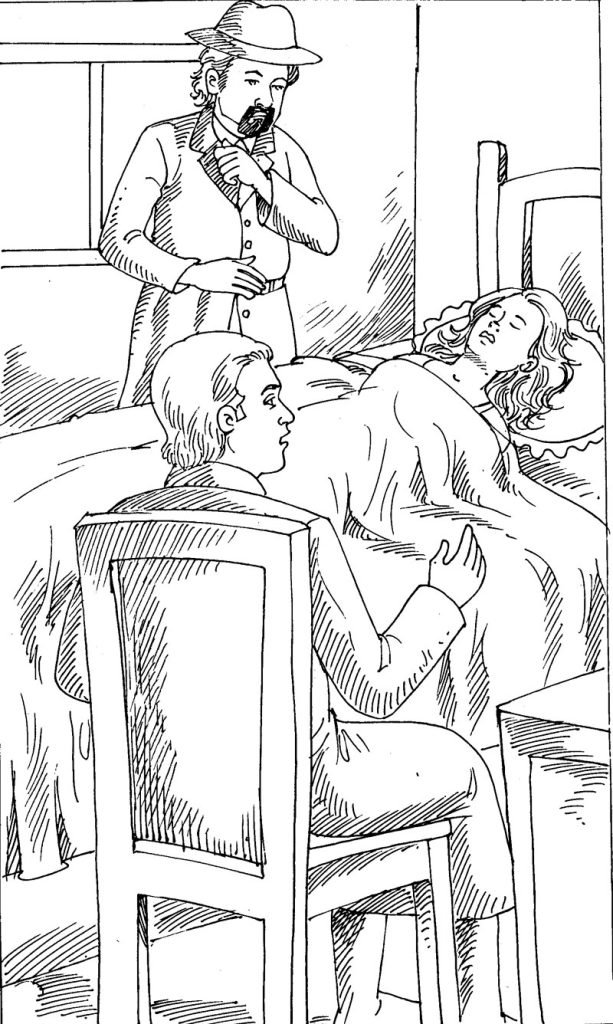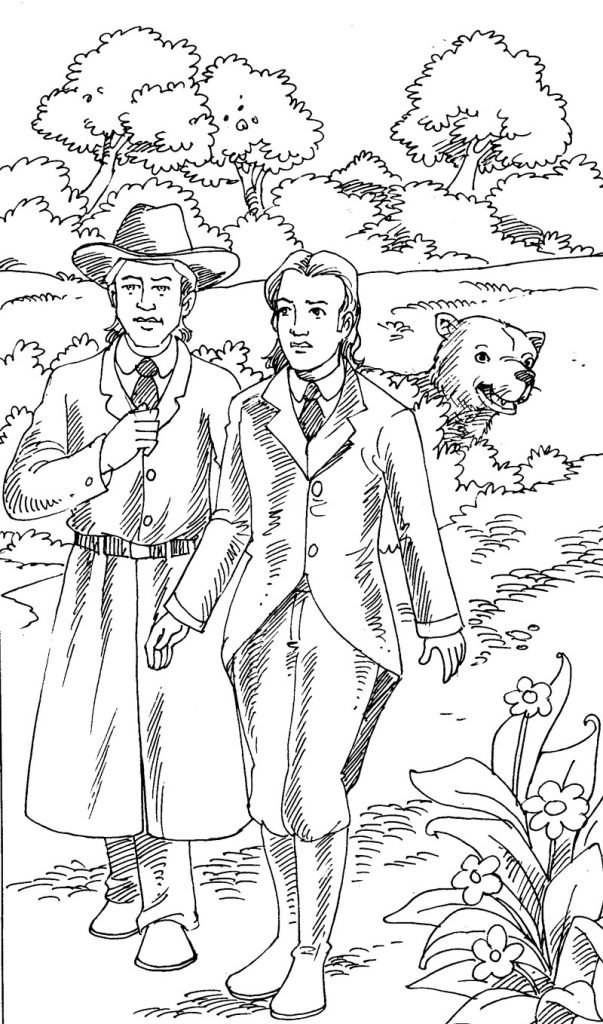Chapter 4
Including a letter from Dr. Seward to Arthur Holmwood, dated September 6th; the September 7th, September 8th, and September 9th entries of Dr. Seward’s diary; the September 9th entry of Lucy Westenra’s diary; and the September 10th and September 11th entries of Dr. Seward’s diary.

Dr. Van Helsing arrives and examines Lucy, who has grown even more haggard. He performs a blood transfusion from Arthur to Lucy, and then sends Arthur away. Van Helsing instructs Seward to stay up with Lucy, and then the older man returns to Amsterdam to retrieve some necessary books and supplies. The next day, Lucy is much refreshed. She writes in her diary that she feels as though Arthur’s presence is with her at night, and that she feels safe in the presence of these men. Seward is exhausted from staying up with her the past two nights, and Lucy insists that she is well enough to sleep without his watch. Seward sleeps on a couch in a room adjacent to Lucy’s. The next morning, the returned Van Helsing wakes Seward. The two men are horrified to discover that Lucy is worse than ever: she has lost an incredible amount of blood, and her gums have shrunken back from her teeth. Van Helsing performs another transfusion, this time using Seward as the donor. The next day, a package containing garlic flowers arrives for Van Helsing. He makes a wreath for Lucy to wear and hangs flowers all around the room, smearing them around all the exits. Lucy is allowed to sleep alone that night, but she instructed not to remove the wreath or open the door or window.
Includes the September 12th entry of Lucy Westenra’s diary; the September 13th entry of Dr. Seward’s diary; the September 17th entry of Lucy Westenra’s diary; a September 18th article from the Pall Mall Gazette; the September 17th entry of Dr. Seward’s diary; a telegram from Van Helsing to Dr. Seward, dated September 17th; the September 18th entry of Dr. Seward’s diary; a memorandum left by Lucy Westenra, dated September 17th.
When Van Helsing and Seward arrive the next morning, they are greeted by Mrs. Westenra, who tells them cheerfully that she removed all of the flowers from the room, including the wreath around Lucy’s neck, and opened the window to let in fresh air. Once Mrs. Westenra has left the room, Van Helsing breaks down the first time Seward has seen his old mentor lose control. Van Helsing regains his composure and the two men go into Lucy’s room to find her horribly drained. This time, Van Helsing is the donor of the needed blood. He then warns Mrs. Westenra to never remove anything from the room, and he tells Dr. Seward that he himself will stay with Lucy for the next few nights. In her diary, Lucy reports feeling much better, even though she can hear the sound of something flapping angrily outside of her window.
The September 18th article in the Pall Mall Gazette reports that a large wolf has escaped from its cage and returned the next day, its head covered by broken glass.
Back at the asylum and awaiting word from Van Helsing, Seward is working in his office when he is attacked by Renfield. The lunatic bursts in and attacks him with a knife, cutting his wrist. Seward knocks him back with a punch, and at that point Renfield seems to lose interest in him. As the attendants rush in, Renfield is busying himself licking up the small pool of Seward’s blood on the floor. Meanwhile, Van Helsing sends a telegram telling Seward to go to Hillingham and spend the night watching Lucy, as the older doctor needs to spend a day in Amsterdam. The telegram is delayed by a day, so Seward does not get the instructions on time.
Lucy has trouble sleeping, and her mother comes in to lie with her in bed. Suddenly, a wolf uses its head to smash through the window; only the animal’s head breaks through the glass. Lucy’s mother thrashes around fearfully, accidentally tearing away Lucy’s garlic wreath. The old woman has a fatal heart attack. The wolf then withdraws its head and disappears, and Lucy loses consciousness. When she comes to, the four maids of the house come in. Terrified, they wrap Mrs. Westenra’s body in a sheet and lay it on the bed. Lucy orders them to go to the kitchen and have a glass of wine to calm their nerves. She also lays all of the garlic flowers on her mother’s body. When the maids don’t come back, Lucy goes to the kitchen to find the four women unconscious; the wine smells like the drug laudanum. Lucy writes that the “air seems full of specks, floating and circling,” and finishes her entry fearful that she will not survive the night.
Includes the September 18th and September 19th entries of Dr. Seward’s diary; an unopened letter from Mina Harker to Lucy Westenra, dated September 17th; a report from Patrick Hennessey, M.D., to Dr. Seward, dated September 20th; an unopened letter from Mina Harker to Lucy Westenra, dated September 18th; and the September 20th entry of Dr. Seward’s diary.
The two doctors arrive the next day but all of the entrances are locked; they are forced to break in through a window. They find the four maids unconscious, Mrs. Westenra dead, and Lucy near death. Seward wakes three of the servants (the fourth is young and continues to sleep), who draw up a bath for Lucy. A messenger arrives from Arthur Holmwood, but Seward tells the maid to tell the messenger to wait; he then forgets about him. After giving the unconscious Lucy a warm bath, the two doctors are at a loss: Lucy needs another transfusion, and neither of them has enough blood to give one. At that moment, Quincey Morris appears; he is the messenger from Arthur that Seward has kept waiting. He gives the blood. Van Helsing has found Lucy’s memorandum, which describes last night’s events. He gives it to Seward, who does not know what to make of it, but for Van Helsing the memorandum confirms his suspicions. Later, Quincey asks Seward how Lucy could possibly absorb so much blood; his is the fourth transfusion, and her body is not big enough to carry so much. While Lucy sleeps, Van Helsing puts the memorandum back on her chest, where he found it. In her sleep, she tries to rip the memorandum to pieces, but Van Helsing manages to save the piece of paper. The next day, Seward reports that Lucy’s teeth look much longer and sharper. Arthur Holmwood arrives. He is overcome with emotion by the tragic events. Seward writes that he doubts Lucy will survive another day.
Meanwhile, Mina writes (in an unopened letter) to tell Lucy that she and Jonathan have returned to England. Jonathan is now the junior partner in Hawkins’ firm, and Jonathan and Mina have been made the heirs to Hawkins’ fortune.

Seward’s assistant Patrick Hennessey reports the latest news on Renfield. On seeing two men who are carrying boxes of earth to the Carfax estate, Renfield escapes and attacks them before he is subdued and brought back to the asylum.
Mina writes to tell Lucy that Mr. Hawkins has died, leaving the Harkers his whole estate. Jonathan is deeply troubled, in mourning and anxious about his new responsibilities.

Lucy is near death. In her sleep, she tears away the garlic wreath that Van Helsing lays on her throat, and her teeth, particularly her canines, are very sharp. Whenever she is awake, she pulls the flowers near her; when asleep, she pushes them away. Seward notices a bat flying around outside. On the morning of September 20th, the doctors discover that the wounds on her throat have completely disappeared. Van Helsing says gravely that the end is near, and they call in Arthur. Lucy asks Arthur to kiss her, “in a soft, voluptuous voice, such as I [Seward] had never heard from her lips.” He is about to do so, when Van Helsing stops him. At first, Lucy is enraged, but after a moment and a short sleep she regains her old self. She calls Van Helsing her true friend, and asks him to protect Arthur and to give her peace. The old man solemnly swears that he will do both. Her eyes meet with Arthur’s after he has kissed her on the forehead instead of the lips, and she dies. She seems to regain her beauty in death, the colour returning to her face.
Analysis
Seward’s inability to diagnose or stem the progression of Lucy’s illness demonstrates the effectiveness of Dracula’s assault on Victorian social order and also exposes the limits of Western science and reason. Only legend and superstition—not reason and science—are effective in fighting Dracula. Even the many advancements of medical science prove useless. Maintaining an open mind and acknowledging the power of superstition, Van Helsing challenges the rigorous confines of Victorian thought. Although Van Helsing proves himself a competent modern surgeon by performing one blood transfusion after another, neither his methods nor his knowledge are restricted to the teachings of Western medicine. As he places garlic flowers around Lucy’s room, he steps outside the role of doctor and becomes more of a “philosopher and a metaphysician.” One of the main ironies of the novel is that the Londoners are made vulnerable to Dracula’s attacks precisely because they live in a world that encourages them to dismiss such supernatural predators as powerless in a civilized society such as Britain.
Though Lucy’s blood transfusions occur so frequently as to seem almost comical, they serve two important metaphorical functions. First, the transfusions confirm the moral purity of the men who submit to them for Lucy’s sake. If there were ever any doubt about the moral righteousness of Van Helsing and his compatriots, Stoker means to dispel it here. The blood itself is characterized as morally outstanding: preparing Holmwood for the first transfusion, Van Helsing points out that his patient “is so young and strong and of blood so pure that we need not defibrinate it.”
Second, the transfusions hint at a kind of sexual intimacy that societal constraints prevented Stoker from writing about openly in the 1890s. The transfer of the men’s blood into Lucy’s veins has physiological effects similar to those of sexual intercourse: afterward, the men feel spent, but the act brings a revitalized flush of colour to Lucy’s cheek. More important, the characters themselves suggest a parallel between the two acts. Van Helsing not only says that it might be improper for Arthur to learn that other men have donated their blood to his fiancée, but also makes a direct connection between blood and sexuality: “No man knows, till he experiences it, what it is to feel his own life-blood drawn away into the veins of the woman he loves.”
Van Helsing’s comments could well be the words a popular romance novelist rather than a medical professional. However, the link Van Helsing makes is crucial to establish the scope of Dracula’s threat. As Dracula repeatedly drains Lucy of her transfused blood, he comes to possess not only Lucy’s body, but also the bodies of all the men who have offered her their blood. In this way, the count begins to make good on his threat to the three weird sisters—if his power goes unchecked, all of these men will indeed “belong to [him].”
